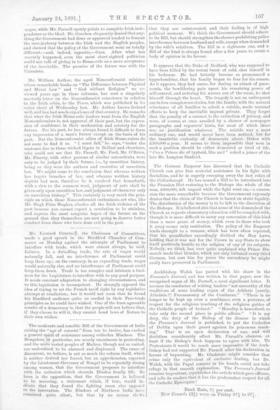Mr. William Arthur, the aged Nonconformist minister *whose remarkable books
on "The Difference between Physical and Moral Law" and "God without Religion" we re- viewed years ago in these columns, has sent a singularly 'masterly letter on the Nonconformist conscience in relation to the Irish crisis, to the Times, which was published in its ,outer sheet of Wednesday last, Mr. Arthur knows Ireland well, and has had much experience of that country. He remarks that what the Irish Home-rule leaders want from the English Nonconformists is, not approval of their past, but the expres- sion of confidence in their moderation and sobriety for the future. For his part, he has always found it difficult to form :any impression of a men's future except on the basis of his past. But the Nonconformist allies of Irish Home-rulers do not seem to find it so. "I must fall," he says, "under the sentence due to those wicked bigots in Belfast and elsewhere, who could not see that Mr. Parnell, Mr. Ford, Mr. O'Brien, *Mr. Finerty, with other persons of similar antecedents, were only to be judged by their future, i.e., by unwritten history, being as they were the authors and executive of unwritten law. We might come to the conclusion that whereas written law begets breaches of law, and whereas written history depicts bad men, therefore be it resolved that henceforth, with a view to the common weal, judgment of acts shall be given only upon unwritten law, and judgment of character only on unwritten history." This certainly is very much the prin- ciple on which those Nonconformist enthusiasts act who, like Mr. Hugh Price Hughes, absolve all the Irish violence of the .past because you cannot expect a revolution to be stainless, and express the most sanguine hopes of the future on the ground that they themselves are now going to deserve better conduct from those who have done evil in the past.






































 Previous page
Previous page